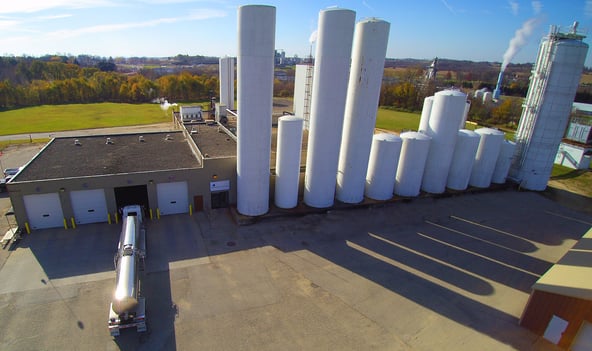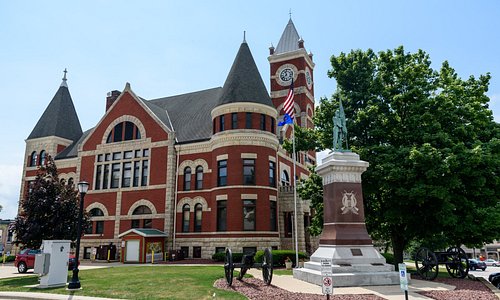TELLING THE MONROE SUSTAINABILITY STORY
Posted by Erin Huls on Apr 3, 2022 5:40:38 PM
 Our Approach:
Our Approach:
Monroe, Wisconsin and the surrounding Green County area is famous for producing some of the most respected and awarded artisan cheese in the world. The Monroe facility is an intermediate liquid whey processing plant strategically located in a major hub of small and medium cheese producers in need of a whey processing option. The area’s rural setting however, which is ideal for dairy farming, creates logistical challenges. MSG saw an opportunity to develop a system that benefits everyone from the farmers to the consumers.
MSG acquired an old cheese plant in Monroe, WI in 2016 as a staging site to collect whey from local cheese producers. However, the local whey supply far outweighed processing capacity at the Monroe site. As a result, excess whey that could not be processed was trucked to Fond Du Lac for processing or simply trucked away from the cheese plant and dumped.
MSG needed a solution to better manage local unprocessed whey volumes without requiring major investment or a new location. The solution was to retrofit our Monroe facility to double its capacity without increasing the facility’s footprint. This expansion included adding surface area to our liquid processing equipment and modifying the current filtration system to handle the capacity gains.
How it impacts the Planet:
The most significant outcome from this project is the reduction in heavy truck traffic and subsequent diesel fuel usage. The truck output from the facility dropped more than 50 percent. This significant drop resulted from water being removed from the whey and recycled locally. The upgrades allowed the Monroe facility to process 20 additional truckloads of local whey per day while also reducing the number of shipments between our Monroe, Fond Du Lac and Adell (WI) facilities by more than 2,500 shipments annually.
Specifically, we reduced truck miles traveled by 237,232 miles, saving 47,446 gallons of diesel fuel, and reducing GHG emissions by 486 metric tons annually. That equals the amount of carbon sequestered by 595 acres of U.S. forests in one year.
As a result of capacity increases at the Monroe Facility, local small-to-medium size cheesemakers had access to whey processing resulting in 377,826 lbs. of whey solids saved from disposal annually. Using every last drop of nutrition in the local milk supply has environmental benefits up and down the supply chain. While the Monroe facility did experience an increase in utility usage, MSG has reduced the amount of energy needed to produce a pound of product by 21 percent since 2014 across all its facilities.
During the process of concentrating whey solids, water is reclaimed and becomes a byproduct. Rather than simply disposing of it like we used to do, the water is now polished and reused in the facility. It is used to prerinse equipment and clean silos. In total, more than 2.8M gallons of water is now reclaimed annually. That’s enough water to fill the Monroe Community Swimming pool at least four times over.
MSG considers the expansion project a major success due to the new efficiencies and ability to process more whey for the local cheesemaking community. Through detailed production records, success metrics being monitored regularly include gallons of water reclaimed, truck miles avoided, and whey solids saved from disposal – but the success story expands beyond just conservation, it also improved the local community in the process.
How it impacts our Communities, Consumers and Employees:
The community impact can be considered among the greatest success stories for this project. Monroe, WI is not a large community therefore the truck traffic generated by MSG was noticeable to local citizens. As a result of the transportation efficiencies created by this project, MSG reduced the equivalent of 2,504 trucks passing through the area on an annual basis. In addition to improving their quality of life, this project had a significant impact on road maintenance and congestion. In addition, 5 full-time positions were added at this rural location that will benefit the local economy.
The project also helps reinforce and support the local dairy industry. The Green County economy is heavily reliant on dairy farming and milk processing. By creating new revenue streams and generating more value for a gallon of milk, the economic benefits are amplified across the rolling hillsides surrounding Monroe. By capturing product that would have been disposed of and creating value from it, MSG is helping further the farmer’s mission of helping meet the nutritional needs of the world.

Our Outcome:
There were many lessons learned from a technical aspect of the project, but the only thing we would do differently is get it done sooner. Between the partnering businesses in the Green County area, to the additional companies we are currently implementing similar projects with, there is a reasonable amount of visibility of the projects’ success and impacts within Wisconsin’s dairy industry.
While the easy solution would have been to add more trucks, the smarter solution turned out to be the opposite. By concentrating leftover whey at the source, a scenario was created where everybody wins. It became more cost effective to collect leftover whey from more than 10+ small-batch artisan cheesemakers in the area, providing an additional revenue stream to them, and keeping their whey from being dumped as waste. It also improved the quality of life for local residents by keeping heavy truck traffic to a minimum and creating sustainable new jobs. It made business sense to reduce transportation costs, but it also helped to significantly to reduce the carbon footprint of upcycling leftover whey, pushing the dairy industry one step closer to its goal of GHG neutrality by 2050.
Forming long term symbiotic relationships with cheese companies is the foundation of MSG’s business. The idea this project is built around is proving to be so beneficial from a financial and environmental standpoint that MSG is currently exploring a variety of options to further expand this model in Monroe and other locations. As a company founded on creating something of value out of something considered waste, sustainability is in our DNA.
Topics: SUSTAINABILITY
